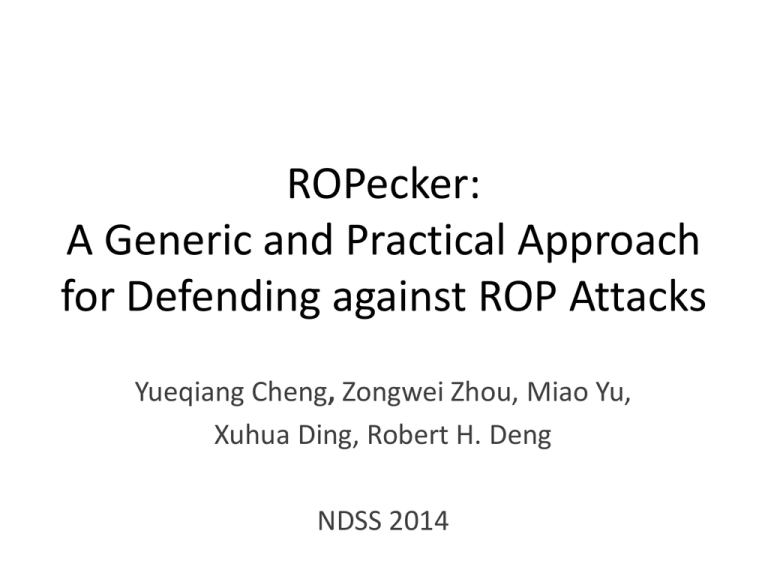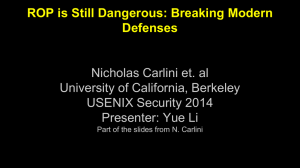ret - NUS Security Research
advertisement

ROPecker: A Generic and Practical Approach for Defending against ROP Attacks Yueqiang Cheng, Zongwei Zhou, Miao Yu, Xuhua Ding, Robert H. Deng NDSS 2014 Background • Typical memory exploit involves code injection – Put malicious code in a predictable location – Pass control to it • non-executable (NX), W⊕X – Hardware support • AMD “NX” bit, Intel “XD” bit (in post-2004 CPUs) • NX block most (if not all) code injection exploits 2 Return-Oriented Programming stack low 0x080484f4 esp 0x0804a014 0x080484f6 0x080484cf 0x08048675 high code 0x080484f4: pop %eax ret ... 0x080484f6: mov (%eax), %eax ret ... 0x080484cf: call %eax; ret … 0x08048675: sh\0 … 0x0804a014: system addr actions eax = 0x0804a014 eax = system addr Call system(sh) 3 ROP cont. • Gadgets – Code section: functionality – Linking section: control transfer 0x080484f4: pop %eax ret • indirect jump instruction (e.g., ret, call %eax, jmp %eax) – Aligned and unaligned • For non-fixed length instruction sets (e.g., x86) – Sparse Distribution & Small size – ret-based ROP jmp/call-based ROP Last Branch Record (LBR) • Dedicated Registers – (src ip, dst ip) – 16 pairs available – Enabled through MSR – Accessible in Ring-0 – NOT distinguish processes 5 Existing Approaches • Prevention – Randomization: • Address Layout Space Randomization (ALSR) • Binary stirring (CCS’12) – Control flow integrity • CCFIR (S&P’13) • Detection – Abnormal behaviors – kBouncer, DROP Check Every Ret & Call-Ret-Pair Checking & Ret Frequency Checking ROPdefender Remove Gadgets Enforce Control [AsiaCCS’11] & Flow Integrity Instruction HyperCrop DROP & [ICISS’11] Randomization [ICISS '09] Remove Gadgets Performance Overhead High Existing Approaches Low ILR and Smashing [Oakland’12] Binary Stirring [CCS’12] No rewriting G-Free [ACSAC’10] Return-less [EuroSys’10] CFLocking [ACSAC '11] Binary rewriting Program binary Source code Requirments 7 Goals Detection & Prevention • Generic – ret-based & jmp/call-based • Transparent – w/o source code – keep the binary integrity • Low performance overhead 8 Methodology • How to detect – A long sequence of gadgets • When to detect – Sliding window • Within, no intervention • Out of the window, check – Critical system calls 9 Detection • Call-ret violation – Jmp/call-based attack • CFI – Completeness and accuracy • Victim’s Execution consists of – a long sequence of gadgets – chained by indirect branch instructions. 10 Feasibility Gadget chain length • Normal execution – Max length 10 • ROP execution – Min length 17 • Detection length Max normal Detection Min ROP 11 Time to detect • A sliding window – Within the window, no detection – When jump out, perform detection – Imple. • Only within the window, the code is executable • When jump out, page fault • Critical syscalls – mmap, mprotect, execev 12 Sliding Window Update 13 Feasibility • Sliding window size – large: better performance & worse accuracy – small: better accuracy & worse performance • ROP requirement – 20KB code size • 8KB (2 pages) or 16KB (4 pages) 14 Algorithm 15 Algorithm 1. Filter non-relevant events 2. Check the history – Gadget chain length in LBRs 3. Search the future – Gadget chain length in the future 4. Continue / Crash 16 LBR record • NOT distinguish processes • Search backwards – Until context switch – (kernel IP, user IP) • Useful records – (context switch, Latest branch] 16 at most 17 Execution emulator • Search the future execution – Possible gadgets • ret – predictable • jmp/call – need emulation – shadow environment – copy-on-write execution 18 Pre-processing Phase ROPT Offline Processing Phase Arbitrary Binary Code Disassembly Engine Inst. & Gadget lists Conversion Engine Inst. & Gadget Bit-Vectors • 6 bytes each time • Byte by byte • Instruction & gadgets info 19 IG Database memory mapping • syscall interception • data structure analysis 20 Architecture Run-time Phase Offline Phase lib1 Stack … App X Binary libn … CPU Execution Trace Apps Pre-processor ROPecker Kernel Module Instruction & Gadget Database Kernel 21 Implementation • Prototype – Ubuntu 12.04 with kernel 3.2.0-29 – A kernel module with 7K SLOC • Checking points – #PF exception – Critical system calls • open, close • mmap2, munmap, mprotect • execve 22 Evaluation • Accuracy – Application with ROP attack – Normal applications • Performance – Micro-benchmark • Cost for system call interception, #PF exception • Cost for ROP checking – Macro benchmark • Benchmark suite 23 Security Evaluation • Real attacks – ROPeme – Htediter (exploitDB) • Generated by Q – Gadgets inside 253 apps under /bin & /usr/bin – All detected 24 SPEC INT2006 Benchmarks: CPU 2.6 % performance lose 25 Disk I/O Performance: Bonnie++ 1.56 % performance overhead 26 Network Performance: httpd 27 Micro Benchmark 28 Conclusion • Generic detection of ROP attack • Sliding window checks • Implementation & evaluation 29 30 Discussions • Short gadget chain • Long gadget • ROP within sliding window – Dynamic sliding window size • Dynamically-generated code • Sliding window thrashing 31











